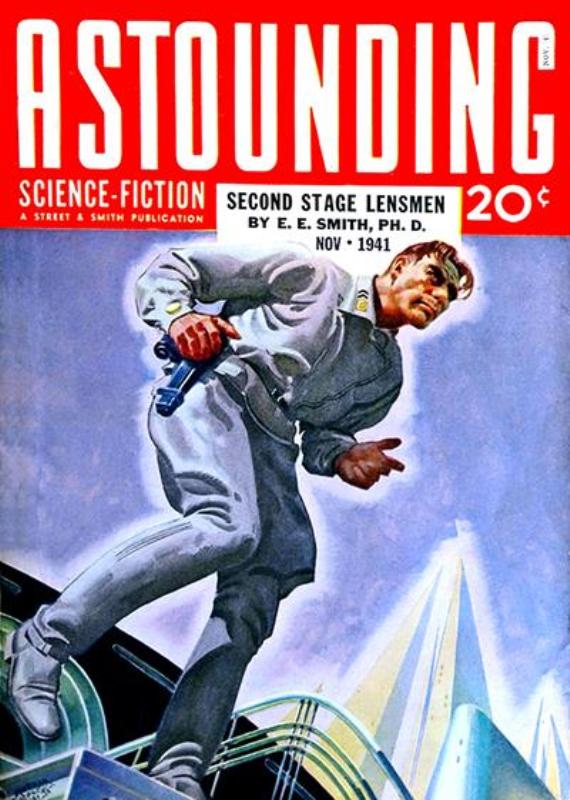 I don't know who to be more embarrassed for: myself, for liking this book when I was young; or the genre, for continuing to revere the series and its author. Because, let's face it, Second Stage Lensman
I don't know who to be more embarrassed for: myself, for liking this book when I was young; or the genre, for continuing to revere the series and its author. Because, let's face it, Second Stage LensmanSecond Stage Lensman
It hasn't aged well.
The hero of Second Stage Lensman
Second Stage Lensman
The books of the series are framed as historical documents written by Smith. He refers to himself throughout as "your historian", at one point writing "your historian is supremely proud that he was the first person other than a Lensman to be allowed to study a great deal of this priceless data". Despite this conceit, there's very little rigour to the narrative - the focus pulls in and out with dizzying speed, events not witnessed by the cast are dropped omnisciently into the story, and there are even assorted lecturettes: one chapter opens with, "This is perhaps as good a place as any to glance in passing at the fashion in which the planet Lonabar was brought under the aegis of Civilization." At one point, Smith writes "... the appallingly horrible sensations of inter-dimensional acceleration. For that sensation is, literally, indescribable." And then promptly goes on to describe it.
Far worse than this is the novel's outright sexism. All women - with the exception of Kinnison's fiancée Clarissa McDougall, the product of a millennia-long breeding programme - are beautiful and brainless. They frequently admit to being unable to "think". Certainly none, except McDougall of course, are capable of becoming Lensmen. She is given a Lens, despite her protestations that as a woman she has less brains and willpower than a man. Even the alien Lensmen are male. When Kinnison's investigations lead him to a planet with an entirely female population of humans, they are, of course, all beautiful. And all naked. And they despise men.
Then there's the dialogue.... The frequent "as you know" moments are perhaps forgivable. But since most of the speech is written in a cringingly-dated slang, it makes it difficult to take the story at all seriously. It's not just that Smith uses his invented "QX" in place of "okay", but lines such as, "Save it!" he ordered. "Jet back, angel-face, before you blow a fuse."
Of course, Kinnison is an absolute paragon. Not to mention a genius. And the most powerful Lensman in all the galaxies. His colleagues are no slouches either. One, Nadrek of Palain, a non-oxygen-breathing alien from a frigid world, often describes himself as "cowardly", but it's put forward as something admirable in his case.
There's very little invention displayed in the book. The various worlds chiefly resemble early Twentieth Century USA but for one or two futuristic details. There are spaceships, of course - ranging from tiny "speedsters" to huge "super-dreadnoughts". All use an "inertialess" space drive for interstellar, and inter-galactic, travel. However, Smith describes everything that is not inertialess as "inert", which is not what that word means. He also has a computer working for weeks on plotting courses for all the ships in a fleet, and a communications centre comprising a "million-plug board".
So why are these books still revered nearly seventy years after they were first published? They're badly written, the attitudes in them are offensive, they show very little rigour in voice or narrative or world-building, and they're wildly implausible. But people still read them. Why?
When they were first published in Amazing Stories and Astounding Stories, each new installment introduced a greater and more powerful threat. The story expanded as it progressed. I can understand the appeal of that. Not to mention opening a story with a space battle between fleets containing millions of ships each. It's the sheer ever-expanding scale of it all. But scale alone is not sense of wonder, and it's a mistake to confuse the two. In fact, scale can work against sense of wonder - make everything simply too big and it either loses its wonder or becomes implausible. There's a fine line to be walked between disbelief and wonder. Using planets as mobile fortresses is sense of wonder. A fleet comprising over a million ships is too much to be entirely plausible (where did all the people to crew the ships come from? how long did it take to build the ships?).
I can, sort of, understand why a cast of paragons battling pantomime villains might also appeal to an unsophisticated reader. But. The genre has moved on since then, it has progressed. And the likes of EE 'Doc' Smith's novels are now embarrassments. They are perhaps indicative of the genre at a particular point in time - the 1940s - but they're not science fiction classics and they are not typical of science fiction as it now is.
Some sf novels remain historical documents, of interest only to historians. Second Stage Lensman

